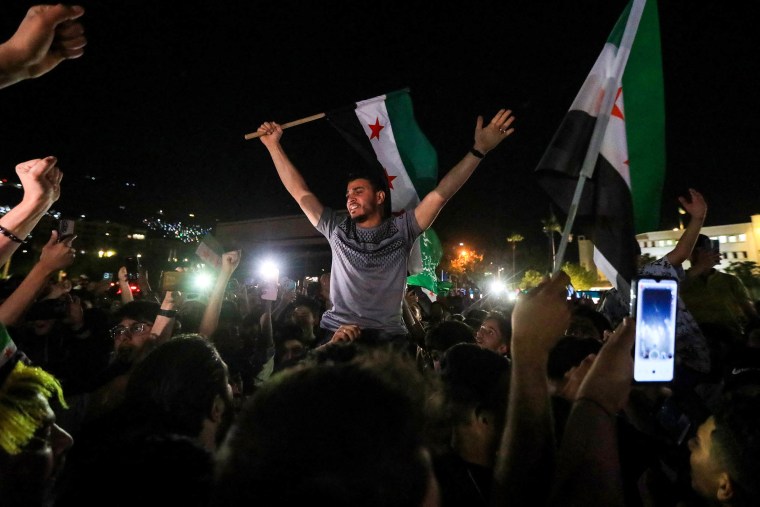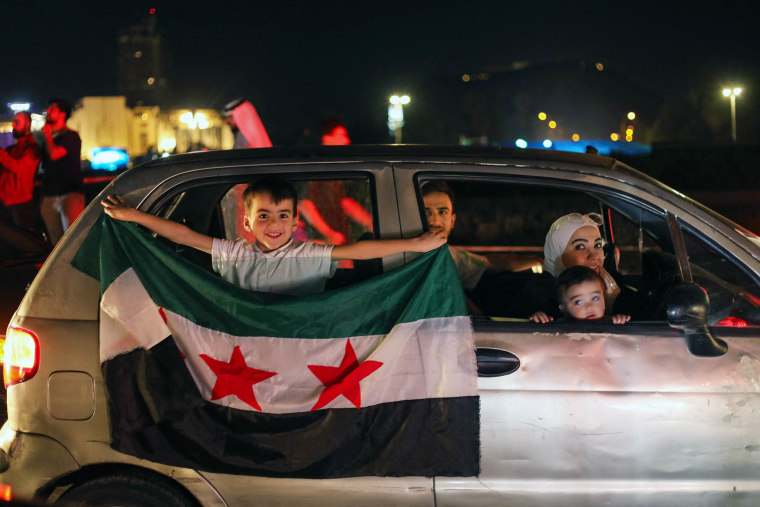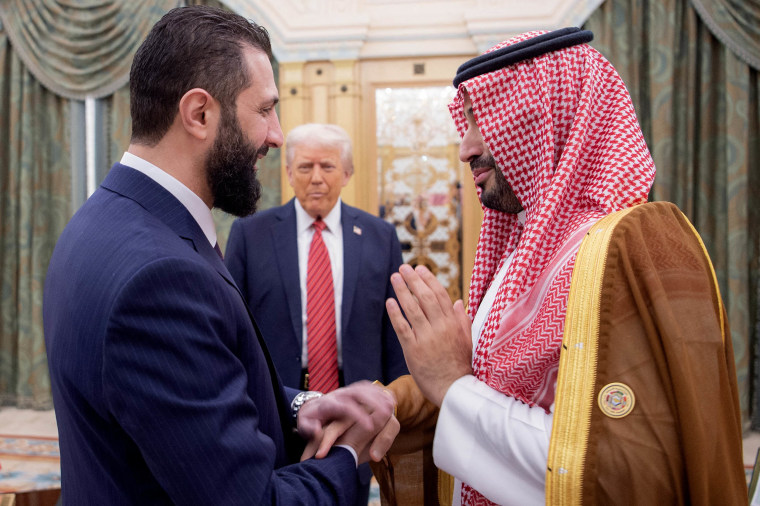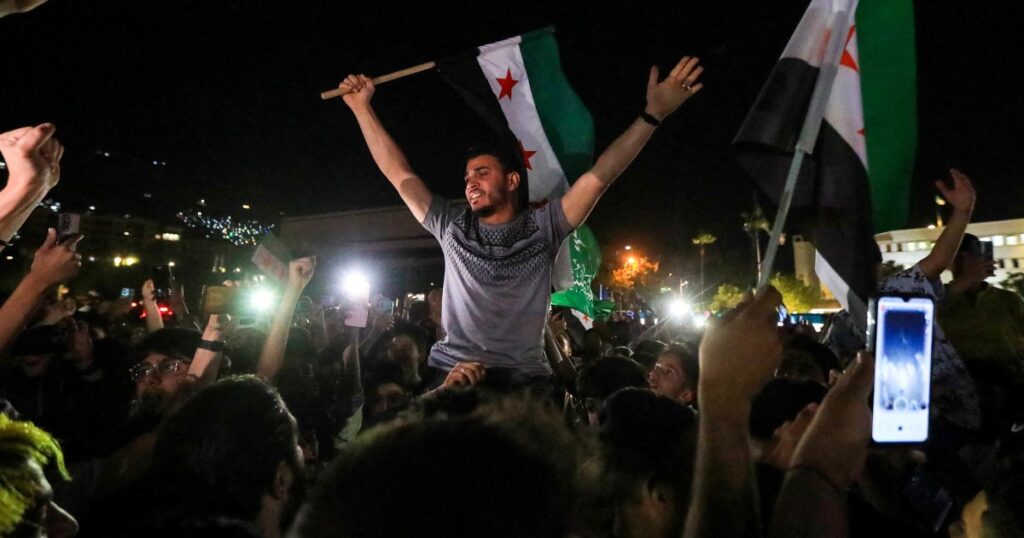The streets of Syria were a carnival of car horns, fireworks and flags after President Donald Trump made the surprise announcement that the United States would lift sanctions that have throttled the country’s economy for more than 45 years.
Trump stunned even close observers on Tuesday by saying he wants to normalize relations after Syria’s longtime president, Bashar al Assad, was toppled in December. Trump met Wednesday with Assad’s successor, interim President Ahmad al-Sharaa, a former leader of an al-Qaeda offshoot group, in Saudi Arabia after urging him late Tuesday to “show us something special.”
That has delighted Syrians and campaigners, who have been calling for sanctions relief to rebuild the war-ruined country — a reconstruction priced up to $400 billion. When Trump made the announcement — telling a Saudi audience “we’re taking them all off” — Syrian housewife Dalal Qallab took to the streets with her children in an outpouring of joy.

“Trump said that he will give us a chance, and we deserve that chance,” Qallab, a mother of four from the port city of Latakia, told NBC News. “After 14 years, I felt that the American president cared about us,” she added. “It was a historic moment. It gave us hope for a better life.”
It’s a chance at relief after a grim 14 years in a country that until now has been one of the world’s most sanctioned.
“For years, sanctions have caused severe damage to the Syrian economy, directly impacting citizens’ lives and hindering development and production,” said Syrian economy minister spokesperson Hassan Al-Ahmad in a statement sent to NBC News.
“This decision presents a genuine opportunity to revive the economy, restore national production cycles, and open doors to investments, technology, and markets,” he added. “From the Syrian government’s perspective, this decision marks a turning point that we aim to leverage wisely and rationally.”
“There have been very few positive things happening in Syria,” said Aron Lund, a Syria expert and a fellow at Century International, a progressive think tank based in New York. “Assad going was, of course, positive in the sense that you got rid of this mass murderer,” but the “economic morass” has persisted.
Assad’s 2011 crackdown morphed into one of the most devastating and complex civil wars of modern times. Iran, Russia and Hezbollah lined up behind Assad, and the U.S., Turkey and others supported different rebel groups. Amid all of that, the Islamic State terroist organization thrived.
Assad stayed in power by killing his own people, deploying chemical weapons and Russian bombs, and torturing and murdering them in an underground network of gulags. The U.N. estimates more than 300,000 people were killed; another 13 million were forced to flee their homes.
In recent years, however, most international aid has flown into places like Ukraine and Gaza. Now it will be far easier for cash to enter Syria, Lund said. He called Trump’s move “a big, good thing for Syria’s chances of recovering and stabilizing as a functioning nation state.”

Such a development would be welcomed by Syria’s neighbors in the Gulf and Middle East. And indeed, Trump said his decision to lift sanctions came at the behest of Saudi Arabia’s Mohammed bin Salman and Turkey’s Recep Tayyip Erdoğan. They want to see a stable Syria, one that does not disseminate refugees, instability and terrorism, and acts as an ally against Iran.
“I hope to see Syria like the UAE, Qatar or Saudi Arabia,” said Nasser Eido, 49, a lawyer who fled to Norway during the war but has since returned to Damascus since Assad fell. “I’m confident we can achieve this. The old regime stole the country’s resources, kept the people poor and left them hungry.”
Trump’s move does not come without risk, however.
Questions still hang over al-Sharaa, who led Assad’s overthrow and says he has reformed since his days as the leader of the Islamist insurgent group Hayat Tahrir al-Sham, which spearheaded the offensive against Assad in early December.
He has given some moderate signals, appointing women and minorities to government positions and saying Sharia, the strict interpretation of Islamic law, will not be imposed. Yet some groups remain uneasy about their place in the new Syria, where there have already been mass killings of Alawites, Assad’s minority Muslim sect.
“There is the risk that the Syrian government, which is pretty hardcore Islamist, ends up doing horrible things: more massacres, or Christians getting killed, or something else that would not play well in Washington,” Lund said. The White House could be in the position of having to defend itself “against the charges that it maybe enabled that,” he added. “It’s not a risk free decision.”

In 1979, the country was blacklisted on the State Department’s first list of state sponsors of terror, alongside Iraq, Libya and former South Yemen. Today, Syria is the only one left, the others being replaced by North Korea, Cuba and Iran. This classification imposes financial restrictions, as well as banning any American military-related imports or exports.
More U.S. sanctions came in 2004, followed by the first measures from the United Nations and European Union a year later. In 2011, when Assad began brutally suppressing demonstrations, the U.S., U.N. and E.U. imposed further import and export controls.
After rebels toppled Assad in just 11 days with little fightback, the U.S. eased some of these restrictions, granting a six-month license that allowed humanitarian aid to enter the country.
Since then, the Trump administration had shown few signs of offering easy progress. It demanded that Syria fulfill a list of conditions that included protecting minorities before any sanctions could be shifted — hence the surprise at Trump’s announcement.
It could be a game changer for millions.
Jumana Hayek, 23, risked imprisonment and torture for receiving 100 euros (around $115) every month from her brother, who had fled to Germany.
“It was hard and dangerous because sending money to Syria wasn’t allowed due to American and international sanctions,” said Hayek, a university student from Aleppo studying electrical engineering. “My brother took risks sending the money, and we took risks receiving it,” she added.
“We suffered a lot, but things will change now.”

